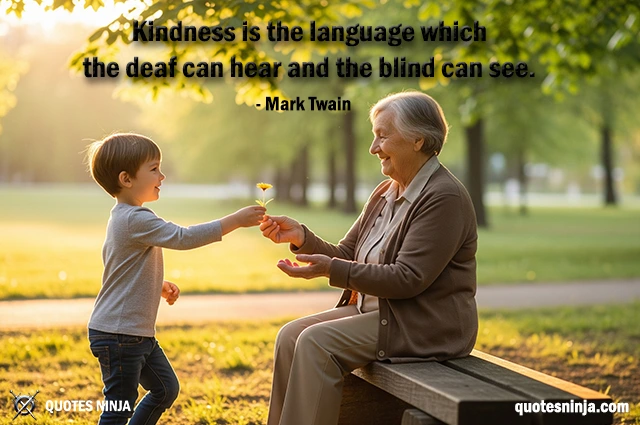
Deeper Meaning of Kindness Quote
Kindness Quote: “Kindness is the language which the deaf can hear and the blind can see.”
The quote is commonly attributed to Samuel Langhorne Clemens, known by the pen name Mark Twain, was an American writer, humorist, and essayist. He was praised as the “greatest humorist the United States has produced”, with William Faulkner calling him “the father of American literature”.
The quote, is a powerful metaphor about the universal nature of kindness.
Here’s a breakdown of its meaning:
- “Kindness is the language”:
This suggests that kindness functions like a language — a way we communicate and connect with others. - “Which the deaf can hear”:
Even someone who cannot physically hear can still understand and feel kindness. That’s because kindness isn’t limited to spoken words; it can be expressed through actions, expressions, and intention. - “And the blind can see”:
Similarly, someone who cannot see can still perceive kindness. It transcends the need for sight — again, because it’s communicated through tone, touch, compassion, and care.
In short, Mark Twain is saying that kindness is understood by everyone, regardless of physical abilities. It’s a universal expression that doesn’t rely on speech or sight. It’s something everyone can feel — because it speaks directly to the heart.
A story inspired by Kindness Quote “Kindness is the language which the deaf can hear and the blind can see.”
Kindness Story: “The Quiet Symphony“
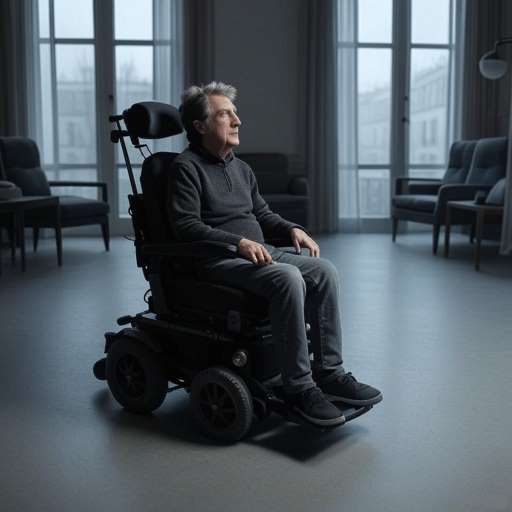
A Rainy Paris Morning:
Rain tapped lightly on the tall windows of the Parisian apartment. The morning sun, hidden behind heavy clouds, offered little warmth. Inside, silence blanketed the room—broken only by the soft hum of the aquarium filter in the corner. Philippe sat in his motorized wheelchair, staring out into the gray.
Once, he had found peace in solitude. But that was before Driss came crashing into his world like a thunderclap.
Now, silence felt like absence.
It had been five days since Driss left. His six-month caregiving trial had ended. With a smile, a handshake, and a promise to visit, he’d gone. Philippe hadn’t expected the ache. He thought he was used to goodbyes.
But Driss was different.
Just then, the door creaked. A nurse entered quietly and began her routine. She didn’t speak much, just nodded politely. Philippe didn’t mind. But her presence only made the emptiness louder.
Meanwhile, across town, Driss stood on a crowded subway platform. His breath formed little clouds in the chilly air. His coat collar was turned up, his shoulders tense. He held a sketchbook under one arm—a habit he’d picked up recently. Though his world had returned to normal, it somehow felt… flat.
Driss remembered Philippe’s laugh. Dry, deep, and unexpected. He remembered the way the man spoke about classical music, about paragliding, about love—even though he couldn’t move a muscle below his neck. That kind of courage had stirred something in Driss. Not pity—respect.
He had never met anyone who needed help, yet offered so much of it at the same time.
Suddenly, the train screeched to a halt. But Driss didn’t move. Instead, he turned, stepped away from the platform, and pulled out his phone.
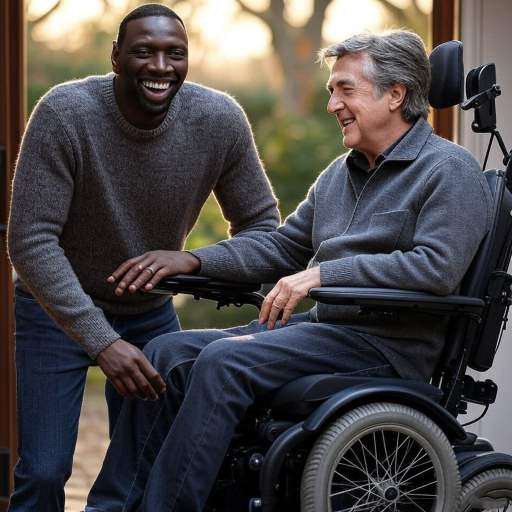
Reunion at the Door:
Back in the apartment, Philippe heard the familiar buzz of the intercom.
A moment later, a voice rang through the speaker: “Hey, wheelchair king. You miss me yet?”
Philippe smiled before he even realized he was doing it.
When Driss entered, the room seemed to inhale again. Life returned.
“You didn’t think I’d let you turn into a grumpy old man, did you?” Driss grinned, dropping his coat on the sofa.
Philippe chuckled. “You’re late.”
“I was early. Just dramatically late.”
Though neither said it, both felt the same thing: something had been missing, and now it wasn’t.
The following days returned to the rhythm they both had grown to love—though this time, things were different. Driss wasn’t just a caregiver anymore. He was a friend. A companion. And perhaps, something more profound: a mirror reflecting dignity back to a man society often overlooked.
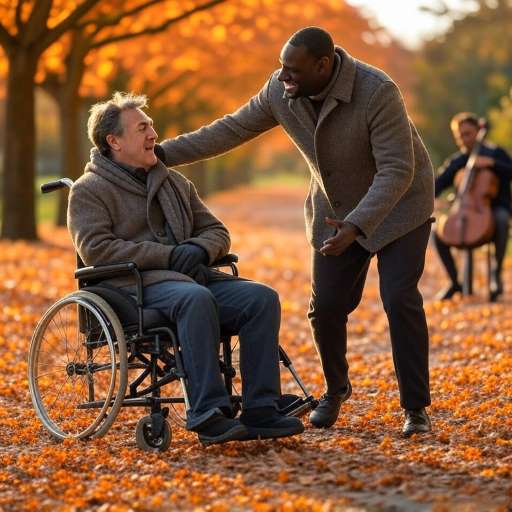
Autumn Walk in the Park:
One afternoon, Driss wheeled Philippe into a park. Autumn leaves painted the path gold and crimson. Children laughed in the distance, and a street musician played the cello nearby. Philippe tilted his head toward the sound.
“I always loved the cello,” he murmured. “It speaks without needing words.”
“Kind of like you,” Driss said, smirking.
Philippe laughed. “And you speak so much, even when no one’s listening.”
“I make the deaf hear, baby.”
They both smiled, but the moment lingered. Underneath the jokes was truth: kindness had spoken louder than words ever could between them. It had healed wounds neither of them talked about. It had bridged the gap between wealth and poverty, between control and vulnerability, between movement and stillness.
It had turned a hired job into a human bond.
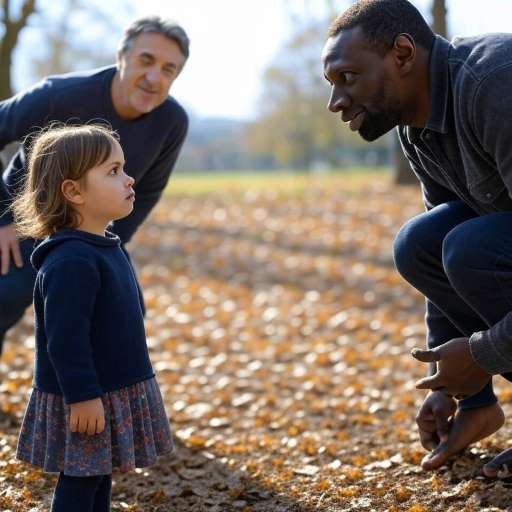
The Little Girl’s Question:
Later that week, as they sat watching a street performance, a small girl approached them. She couldn’t have been older than eight. She looked at Philippe, then at Driss, and finally asked, “Why doesn’t he talk back?”
Philippe smiled gently.
“He can talk,” Driss replied, crouching to her level. “But sometimes, people speak with their hearts instead of their mouths.”
The girl tilted her head. “Like a song without words?”
“Exactly,” Driss said, glancing at Philippe. “And if you listen closely, it’s the kindest sound in the world.”
The girl nodded thoughtfully and walked away, leaving the two men in silence once more.
But this silence was warm.
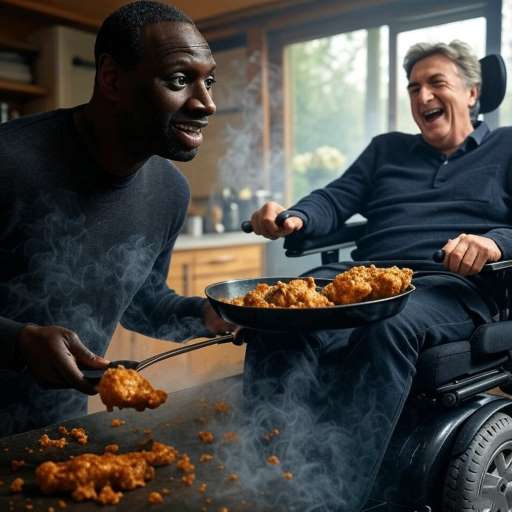
Kitchen Chaos and Laughter:
That night, as Driss prepared dinner (badly), he burned the onions. Again.
“Cooking is an art,” Philippe said dryly, coughing from the smoke.
“It’s also a crime scene tonight,” Driss admitted, laughing.
Philippe laughed too, his eyes alive. “Do you know what kindness is, Driss?”
“A fancy word rich people use when they give away half a sandwich?”
Philippe shook his head. “It’s what you brought here. To this home. To me. It’s something even the deaf can hear, and the blind can see.”
Driss paused.
He didn’t need to ask what Philippe meant. He felt it every time they sat in silence together, every time they laughed until tears ran down his cheeks, every time he looked past the chair and saw only the man.
“I didn’t do much,” Driss finally said.
“You were yourself. That’s everything.”
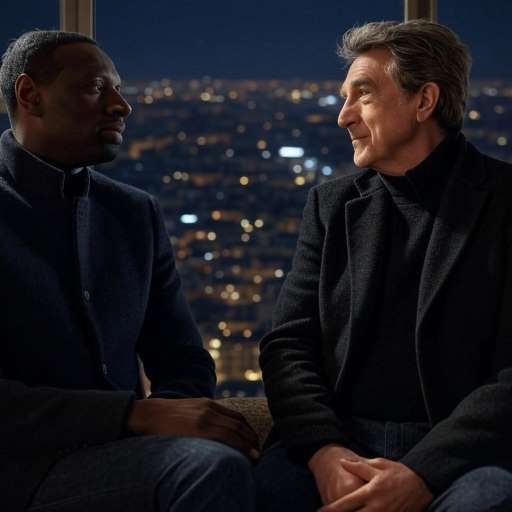
The Window at Night:
As the night wore on, the two sat near the window, watching the lights of the city flicker like stars.
Outside, the world rushed by. But inside, time slowed, softened by the presence of something rare—something real.
Kindness didn’t need to be loud. It didn’t need to be explained. It just needed to be offered.
And between a man who could not move and a man who never stopped moving, it had found a home.
Moral of the story:
In the quiet moments between laughter and silence, between struggle and joy, Driss and Philippe discovered that true connection doesn’t require perfect words or flawless bodies—it only needs open hearts. Their story reminds us that kindness is not limited by speech, sight, status, or ability. It flows freely between those willing to give and receive it. As Mark Twain so beautifully put it, “Kindness is the language which the deaf can hear and the blind can see.”
To explore more on stories and dive into related ideas, be sure to check out the other posts where we cover all sort of stories related to quotes. Stay tuned for more…..
To explore more on quote topics, be sure to check out the other topics where we cover all categories of quotes. Stay tuned for more…..

